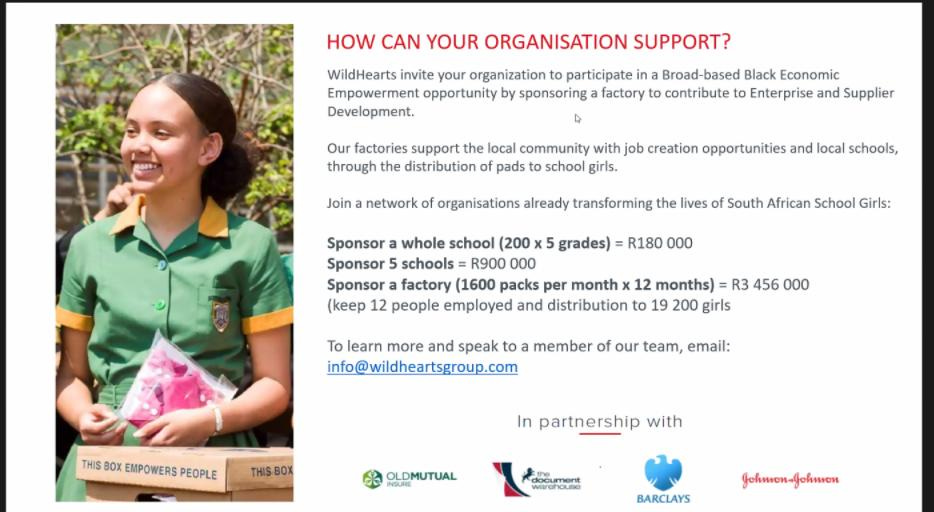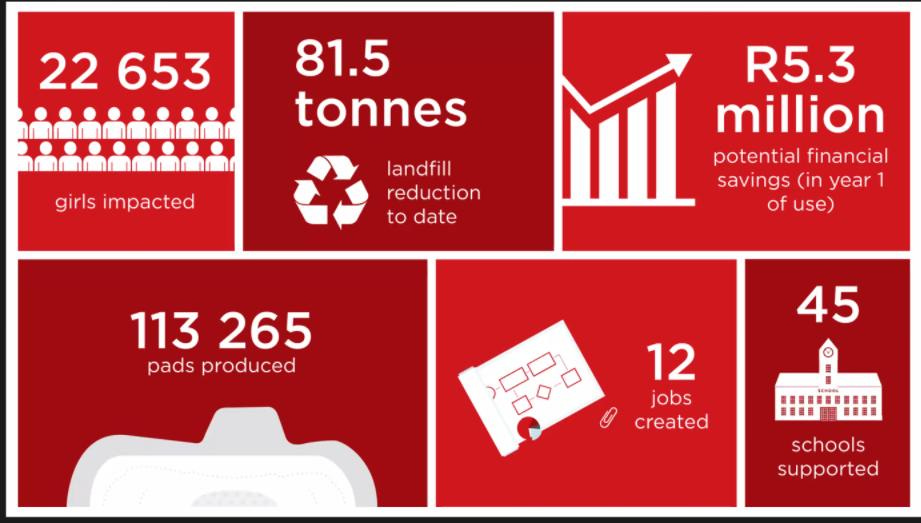By Gargi Bagchi – Managing Editor, The African Gazette
Africa, as a developing continent is grappling with multifarious socio-economic challenges – lack of access to healthcare and education, prevalence of gender inequality as well as lack of female empowerment. Period poverty is also a reality.
Menstruation: The taboo topic
Around the world, about 52% of girls and women are in the reproductive age group. Yet, the topic of menstruation is still shrouded by a huge stigma making it tough for women and girls in several regions and countries to access sanitary products and making optimal menstrual hygiene a regular practice.
It has been reported that menstrual hygiene is the basis of well-being and dignity of all girls and women. School-aged girls, especially are prone to missing classes owing to insufficient menstrual hygiene management. According to a BBC report, couple of years back, the estimated number of girls missing school due to their periods every year in UK stood at 137,000.
Often inadequate conditions in school for dealing with menstrual hygiene and excessive costs of menstrual hygiene management products are the common reasons behind school absenteeism.
Africa is no exception to this situation. In South Africa alone, it’s reported that 7 million girls cannot afford purchase of sanitary products meant for periods’ management and make do with poor and unhygienic alternatives like newspapers, old clothes, which have an adverse effect on their health. Periods related mishaps also escalate forcing girls to miss school thus disrupting their learning process.
Organizations contributing to tackling period poverty in South Africa
Several organizations over the years have used their platforms to reduce the stigma associated with periods and offer increased access to proper and hygienic sanitary products. Project Dignity has distributed sanitary pads in to South African students since 2010 along with providing education about menstrual health and hygiene and HIV.
Candice Chirwa, founder of Qrate Za – has been educating young women in South Africa about menstruation since 2018. Candice is a menstruation activist, an academician and a speaker working to destigmatize menstruation and end period poverty.
StartHer in Health initiative – started in February 2020 by WildHearts Group
The WildHearts Group in South Africa is committed to addressing the problem of girls’ education through measures ensuring proper management of basic menstrual health. It has been reported that around 1/3 of school going girls in the country drop out of school during their periods, thereby missing out on 4 days of school every month.
The group has manufactured over 113 000 reusable pads, distributing to 45 schools and impacting over 22 600 girls between ages 9-18 from low SEM (Socio-Economic Measure) areas, vulnerable to period poverty.
WildHearts Group, a social enterprise based in Glasgow, Scotland has a mission to conduct ‘business for good’. WildHearts group believes that corporate strategies have to be built for inclusive growth keeping in mind the existing inequality and global poverty. Financial yardsticks alone cannot be viable pointers for success in the present corporate world.
WildHearts Business for Good Webinar – August 12, 2021
Recently, a webinar event was organized called the WildHearts Business for Good Webinar in partnership with WildHearts UK, Old Mutual Insure, Johnson & Johnson and The Document Warehouse for sharing the group’s story and journey in relation to StartHer in Health initiative to the like-minded corporates and individuals for supporting this, to drive a mutually beneficial future for the young people.
Dual Purpose of the Project
The project is not only helping in empowering young girls so that they can continue with their education unhampered and later contribute towards the growth of the economy, but the company’s entire process of production to distribution ensures employment and empowerment for local black South African women and girls.
Speaking at the webinar event, Colin Downie, Sales and Partnership Director WildHearts Group said – “It is critical to support and empower young women and girls to stay in school during their menstrual cycles as it significantly increases their educational achievement, their future economic attainment and ultimately their employment prospects.”
He further adds, “This project is much more than a CSR activity; in addition to supporting girls, it helps create jobs for women in low income communities, boosts economic development in hard-to-reach areas and provides dignity to all that get involved in supporting it; we look forward to opening as many factories as we can across all provinces in South Africa. Our objective is to roll out this initiative throughout the country in collaboration with our strategic and industry partners in order to drive the attainment of the UN Sustainable Development Goals”.
How does the project operate – Contributions of the organizations involved
The distribution of the reusable sanitary pads to hardest to reach areas of Southern Africa is carried out by the delivery fleet of The Document Warehouse (TDW).
According to Virginia Hendricks, the Consultant and Director of TDW, “The most fundamental occurrence in a girl’s life has been a taboo subject for far too long! We need to change this unmentionable thought pattern. We aim to do this by openly talking about menstruation, and supplying our young women with their basic requirement during their menstrual cycle, not for a month or two months, but for 5 years!”
Johnson & Johnson provided the required initial capital investment to assist in launching the StartHer in Health initiative in South Africa. Their know-how in comprehensive healthcare was crucial in the advancement of the StartHer Pads and the take-off of the pilot in 2019.
Barclays has started the Wildhearts Group’s 5 for 15 initiative in the UK in partnership with a group of WildHearts Global Youth Ambassadors. The idea is that fifteen pounds offer pads for a girl for 5 years.
Barclays has also organized several coffee mornings for raising funds and featured the WildHearts StartHer in Health initiative at their annual Diversity and Inclusion Ball, raising thousands of pounds for the project.
The History
Old Mutual Insure partnered with Wildhearts Foundation Africa and launched this project in Nelspruit, Mpumalanga on February 2, 2020. The project encourages nurturing of small-sized manufacturing plants that are fully owned and operated by women, thereby boosting the growth of smaller enterprises and job creation.
In a statement to The African Gazette, Antonia Oakes, Executive CX & Responsible Business for Old Mutual Insure said, “The aim is to keep the girl child in school and ensure that they gain education. This factory has also created a female entrepreneur, providing jobs to 12 others”.
Old Mutual Insure was chosen as a finalist in Corporate Social Responsibility Award for the World Procurement Awards 2020, for this project.
Duma Nongauza, Head of Procurement, Old Mutual Insure told The African Gazette, “Women, especially empowered women have a real multiplier effect on their communities and society. Through this initiative we would like to bring together nexus of passionate and committed people as well as organisations to create a web of support and care which will have long lasting impact for our collective and shared future.”

The path ahead
No doubt, stories of menstruation taboos, myths and customs regarding menstruation are still widespread. Nevertheless, it’s encouraging to note that non-profits and organizations are working towards making menstruation an unawkward topic to discuss.
The actions and initiatives described above are certainly progressive steps in tackling the taboo topic.
However, governments and organizations must continue working cohesively for developing effective educational plans and sustainable sanitation products to support girls and women globally with critical data regarding menstruation and assist in overcoming the obstacles of the taboo topic.
Women’s month in South Africa
The month of August every year is commemorated by South Africans as Women’s month when their achievements and important roles they play in the economy and community are highlighted.
The collaborative efforts of these organizations to contribute towards the welfare of rural women and school going girls in South Africa is an additional boost to the ongoing efforts of the government and marks a true celebration of Women’s month.
Unitedly we can make a difference
The social impact being brought about these companies also reinforces the fact that a positive change in society is possible in all areas, period poverty is one of them.
It is through consistent efforts to undertake social initiatives and fighting for human rights can community development take place along with creating a healthy socio-economic milieu.
Non-profit organizations and volunteers were the sole instruments for bringing in social impacts some decades back.
As consumers these days are becoming conscious of various environmental and social issues, increasing number of socially responsible ‘more for-profit’ companies are also joining in the commitment to fight different social issues and build a system of sustained capitalism, alongside the volunteers and non-profit organizations.
The efforts and activities of these organizations also propel us to ponder over certain basic questions: Are we giving back enough to society as an individual/as an organization? Are we consistently and actively participating in the CSR activities at our workplaces?
Gargi – Currently Managing Editor of The African Gazette, she has been an independent content creator, researcher and editing professional. With 12+ years of experience across diverse writing genres, Gargi comes with an exposure of working with a multitude of global clients in the digital space. She has a penchant for reading and researching on new topics, and enjoys listening to music and traveling. She can be contacted through Email or Linkedin
The post End Period Poverty: Build a Better World first appeared on The African Gazette.



